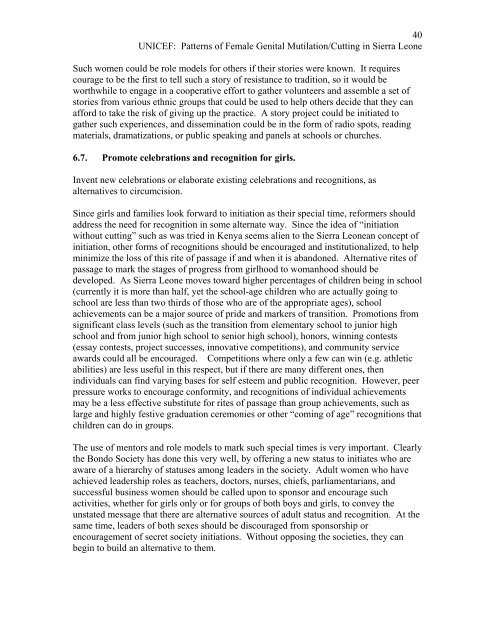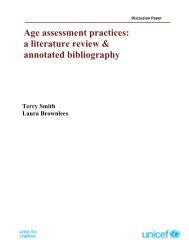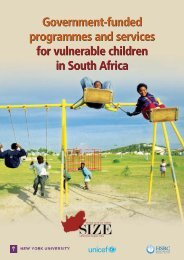Patterns of Female Genital Cutting in Sierra Leone - Unicef
Patterns of Female Genital Cutting in Sierra Leone - Unicef
Patterns of Female Genital Cutting in Sierra Leone - Unicef
Create successful ePaper yourself
Turn your PDF publications into a flip-book with our unique Google optimized e-Paper software.
40<br />
UNICEF: <strong>Patterns</strong> <strong>of</strong> <strong>Female</strong> <strong>Genital</strong> Mutilation/<strong>Cutt<strong>in</strong>g</strong> <strong>in</strong> <strong>Sierra</strong> <strong>Leone</strong><br />
Such women could be role models for others if their stories were known. It requires<br />
courage to be the first to tell such a story <strong>of</strong> resistance to tradition, so it would be<br />
worthwhile to engage <strong>in</strong> a cooperative effort to gather volunteers and assemble a set <strong>of</strong><br />
stories from various ethnic groups that could be used to help others decide that they can<br />
afford to take the risk <strong>of</strong> giv<strong>in</strong>g up the practice. A story project could be <strong>in</strong>itiated to<br />
gather such experiences, and dissem<strong>in</strong>ation could be <strong>in</strong> the form <strong>of</strong> radio spots, read<strong>in</strong>g<br />
materials, dramatizations, or public speak<strong>in</strong>g and panels at schools or churches.<br />
6.7. Promote celebrations and recognition for girls.<br />
Invent new celebrations or elaborate exist<strong>in</strong>g celebrations and recognitions, as<br />
alternatives to circumcision.<br />
S<strong>in</strong>ce girls and families look forward to <strong>in</strong>itiation as their special time, reformers should<br />
address the need for recognition <strong>in</strong> some alternate way. S<strong>in</strong>ce the idea <strong>of</strong> “<strong>in</strong>itiation<br />
without cutt<strong>in</strong>g” such as was tried <strong>in</strong> Kenya seems alien to the <strong>Sierra</strong> <strong>Leone</strong>an concept <strong>of</strong><br />
<strong>in</strong>itiation, other forms <strong>of</strong> recognitions should be encouraged and <strong>in</strong>stitutionalized, to help<br />
m<strong>in</strong>imize the loss <strong>of</strong> this rite <strong>of</strong> passage if and when it is abandoned. Alternative rites <strong>of</strong><br />
passage to mark the stages <strong>of</strong> progress from girlhood to womanhood should be<br />
developed. As <strong>Sierra</strong> <strong>Leone</strong> moves toward higher percentages <strong>of</strong> children be<strong>in</strong>g <strong>in</strong> school<br />
(currently it is more than half, yet the school-age children who are actually go<strong>in</strong>g to<br />
school are less than two thirds <strong>of</strong> those who are <strong>of</strong> the appropriate ages), school<br />
achievements can be a major source <strong>of</strong> pride and markers <strong>of</strong> transition. Promotions from<br />
significant class levels (such as the transition from elementary school to junior high<br />
school and from junior high school to senior high school), honors, w<strong>in</strong>n<strong>in</strong>g contests<br />
(essay contests, project successes, <strong>in</strong>novative competitions), and community service<br />
awards could all be encouraged. Competitions where only a few can w<strong>in</strong> (e.g. athletic<br />
abilities) are less useful <strong>in</strong> this respect, but if there are many different ones, then<br />
<strong>in</strong>dividuals can f<strong>in</strong>d vary<strong>in</strong>g bases for self esteem and public recognition. However, peer<br />
pressure works to encourage conformity, and recognitions <strong>of</strong> <strong>in</strong>dividual achievements<br />
may be a less effective substitute for rites <strong>of</strong> passage than group achievements, such as<br />
large and highly festive graduation ceremonies or other “com<strong>in</strong>g <strong>of</strong> age” recognitions that<br />
children can do <strong>in</strong> groups.<br />
The use <strong>of</strong> mentors and role models to mark such special times is very important. Clearly<br />
the Bondo Society has done this very well, by <strong>of</strong>fer<strong>in</strong>g a new status to <strong>in</strong>itiates who are<br />
aware <strong>of</strong> a hierarchy <strong>of</strong> statuses among leaders <strong>in</strong> the society. Adult women who have<br />
achieved leadership roles as teachers, doctors, nurses, chiefs, parliamentarians, and<br />
successful bus<strong>in</strong>ess women should be called upon to sponsor and encourage such<br />
activities, whether for girls only or for groups <strong>of</strong> both boys and girls, to convey the<br />
unstated message that there are alternative sources <strong>of</strong> adult status and recognition. At the<br />
same time, leaders <strong>of</strong> both sexes should be discouraged from sponsorship or<br />
encouragement <strong>of</strong> secret society <strong>in</strong>itiations. Without oppos<strong>in</strong>g the societies, they can<br />
beg<strong>in</strong> to build an alternative to them.

















